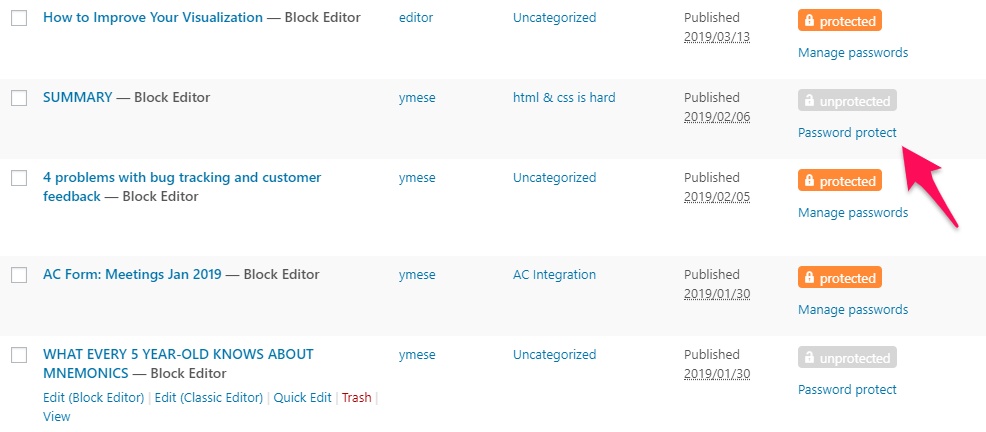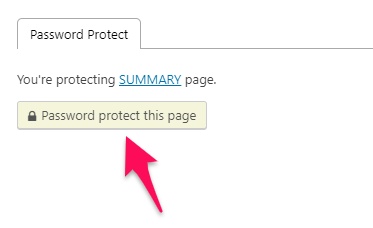There must be a better way instead of having users to enter a long and complicated password every time. That’s why we come up with the so-called “quick access links” (QALs) or access links for short. These links allow users to directly access the protected content without asking for a password.
Our QALs save users a lot of time as well as providing better user experience by not having to enter passwords manually. They come in handy when there are a lot of protected pages and posts or when users would like frequent access.
In this article, we will walk you through the following key points:
Requirements:
- Password Protect WordPress Lite version 1.3.0 or greater
- Password Protect WordPress Pro version 1.1.3 and greater
How to generate QALs
Go to the page or post which you want to generate a quick access link and click “Password protect”.

Then click “Password protect this page”.

Our plugin will automatically generate a random string which is also the password for your content. Simply click the “Copy access link” icon to generate and copy the quick access link associated with this password.

Create QALs manually
Once Password Protect Child Pages is enabled, all child pages will inherit their parents’ passwords. You can’t create or manage passwords of child pages separately. In consequence, you have to create access links for child pages manually.
All you need to do is to copy the ?ppwp_ac parameter from the parent page’s access link and paste it into the child pages’ URL. For example:
Let’s say, an access link of parent page is: https://passwordprotectwp.com/parent-page/?ppwp_ac=eyJwYXNzd29yZCI6IjEyMyJ9
The access link of child page will be: https://passwordprotectwp.com/parent-page/child-page/?ppwp_ac=eyJwYXNzd29yZCI6IjEyMyJ9
Logic & Limitations
- An access link is associated with one password by default. That means when you edit/ deactivate/ activate/ delete a password, you’re editing/ deactivating/ activating/ deleting the corresponding access link.
- You can automatically expire the access links after a number of days or clicks (usage) just like what you can do with passwords.
- When users access protected content via a quick access link, our plugin will save the password as a cookie to their browser at the same time. So they can re-visit the page multiple times without proving the password until the cookie expires.
- You can modify the cookie expiration time under our plugin’s settings page.
- If users re-access the page via the quick access link, a new cookie will be generated and override the existing one.
- To avoid increasing the number of password usage every time users reload the private page, the access token will be removed from the page URL once users access the content successfully. This behavior might affect your campaign tracking.
- If two pages are protected by the same password, their access links will have the same ?ppwp_ac parameter. However, accessing one page successfully doesn’t mean that users can see the other content without re-entering the password
- This feature works with single posts of any post type.
- To get more information about the users who have used your quick access links, please refer to our PPWP Statistics extension.
- This feature is available in Pro version only. So if you deactivate PPWP Pro, all quick access links will not work anymore.
